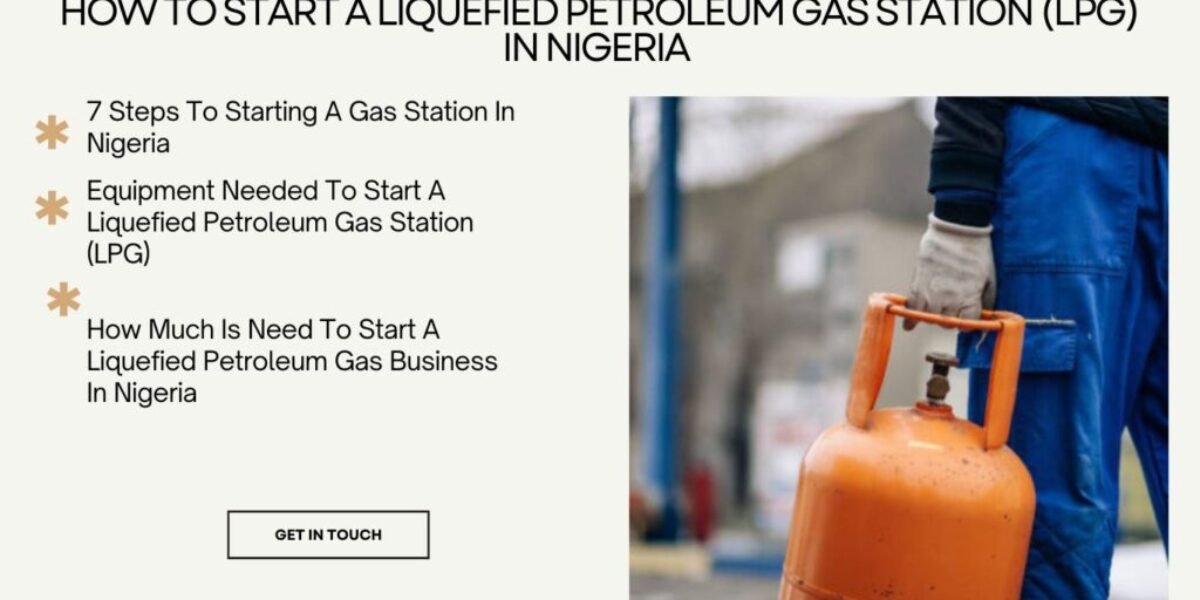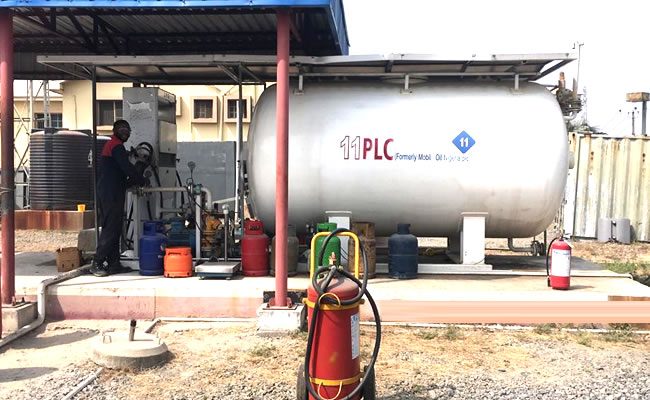How To Start A Liquefied Petroleum Gas Station (LPG) In Nigeria – 7 Steps To Starting A Gas Station In Nigeria
How To Start A Liquefied Petroleum Gas Station (LPG) In Nigeria – 7 Steps To Starting A Gas Station In Nigeria
Cooking is essential in society, and cooking gas is the best option in a country like Nigeria. Nigeria is blessed with many things that can be profitable and become businesses. We represent Africa as the giant and are blessed with minerals, especially petroleum.
Petroleum is one of our most outstanding minerals; it is often sold as fuel. But fuel isn’t all you get from it. You also get a liquefied petroleum gas( LPG) for cooking. Cooking in Nigeria with cooking gas has become very popular due to the unstable electricity issues.
This has been discovered to be a faster route for easy cooking, which is why it is profitable.
Are you looking forward to starting a Liquefied Petroleum Gas Business in Nigeria? Or are you interested in learning about the cost and requirements of starting one? Whatever your reason for wanting to know about the Liquefied Petroleum Gas business, we’ve got you covered.
In this article, we will discuss everything you need to know about starting a gas station business in Nigeria, including the required documents and equipment and any other questions you may have. If you want to learn more about these, join us as we explore them.
How Lucrative Is The Liquefied Petroleum Gas Station Business In Nigeria
A gas station is very lucrative for entrepreneurs looking for some of the most profitable businesses. Cooking gas has become the most popular cooking utility for everyone, from the poor to the middle class and even elites. As such, it generates a lot of revenue daily.
As lucrative as it is, your daily revenue depends on the location and demand for your services in that locality. Some companies make over 40 to 100 thousand daily, while some earn less. This is why picking a strategic location for a workspace is very important.
How Much Is Need To Start A Liquefied Petroleum Gas Business In Nigeria
The cost of starting a gas station business in Nigeria can vary depending on several factors, including the size of your storage tanks, the type of dispenser you choose, and whether you opt for locally assembled or foreign dispensers.
There are a lot of factors to consider to determine the price of starting a gas plant in Nigeria. The price for starting a gas plant in Nigeria is between 10 million to 30 million. depending on the equipment used.
Equipment Needed To Start A Liquefied Petroleum Gas Station (LPG)
Now that you’re excited to embark on your journey in the gas business let’s delve into the essential materials you’ll need to get started.
Remember, the specific requirements might vary based on the size and scale of your operation which we will expand on later in our conversation. Here’s a detailed breakdown of the equipment you will need for your gas business:
When selecting the appropriate LPG storage tank for your business, it’s crucial to consider your projected customer base and daily gas demand. You will be guided to help you choose the best capacity for your needs, ranging from 1.5 tons to 10 tons, including options for single and twin tank configurations.
Dispensers are machines used for the selling of Liquefied Petroleum Gas (LPG) from the tank into the gas cylinders.
There are different types of dispensers available for different LPG gas station configurations, categorized by different functionality and all of these come at different rates.
High-quality piping and valves designed specifically for LPG are crucial. Improper materials can lead to leaks and safety hazards.
Regulators control gas pressure to ensure safe and efficient appliance use. Different appliances require specific pressure ranges.
You’ll need equipment to transfer LPG from bulk suppliers to your storage tanks. This might involve trucks, hoses, delivery vehicle
Invest in reliable vehicles to transport filled gas canisters to customers. Options include vans or small trucks with secure compartments for cylinders.
Prioritize a safe working environment for yourself and your employees. Essential safety equipment includes:
Fire Extinguishers: Strategically placed fire extinguishers of the appropriate type (ABC or BC) for extinguishing LPG fires.
Leak Detectors: Electronic or combustible gas detectors to identify potential leaks promptly.
Personal Protective Equipment (PPE): Provide employees with appropriate PPE like safety glasses, gloves, and respirators for handling LPG.
Equip yourself to serve your customers efficiently:
Weighing Scales: Ensure accurate gas filling and pricing with a reliable weighing scale.
Point Of Sale Device: Consider a POS system for streamlined billing and record keeping (optional but recommended).
By carefully selecting these materials and prioritizing safety, you’ll be well prepared to establish a successful and reliable gas business! Remember, partnering with a reputable supplier like Pawa Energy can provide high-quality equipment, expert advice, and ongoing support throughout your journey.
Steps To Start A Liquefied Petroleum Gas Station (LPG) In Nigeria
Here are some of the steps to follow if you want to start up your own liquefied petroleum gas station. The steps to follow include the following:
- Market Research and Feasibility Study
- Legal and Regulatory Compliance
- Infrastructure and Equipment
- Supply Chain Management
- Safety Measures and Employee Training
- Marketing and Promotion
- Customer Service and Quality Control
Let’s get started.
1. Market Research And Feasibility Study
To successfully start an LPG business, it’s crucial to conduct thorough market research and feasibility studies. Understand the current demand and consumption patterns for LPG in different regions, identify potential customers, evaluate market competition, and determine the viability of a new LPG business within your chosen niche.
2. Legal And Regulatory Compliance
Next, it’s imperative to adhere to the legal and regulatory requirements to operate an LPG business in Nigeria. Begin by registering your business with the Corporate Affairs Commission (CAC) to give it a legal identity.
Obtain relevant permits, certifications, and licenses from regulatory bodies such as the Department of Petroleum Resources (DPR) and the Standards Organization of Nigeria (SON).
3. Infrastructure And Equipment
Investing in adequate infrastructure and equipment is crucial for the successful operation of an LPG business. Consider setting up a storage facility with the necessary safety measures and obtain approval from appropriate authorities.
Additionally, procure high-quality gas cylinders, pressure regulators, safety devices, valves, piping systems, and filling scales to ensure proper handling and distribution of LPG.
4. Supply Chain Management
Establishing strong partnerships with reputable LPG suppliers is essential for consistent and reliable product sourcing. Negotiate supply agreements with multiple suppliers to ensure a steady flow of inventory.
Maintain healthy relationships with transporters for seamless delivery to your storage facility and consider investing in your own fleet of delivery trucks for better control over logistics.
5. Safety Measures And Employee Training
Safety is of utmost importance when dealing with LPG. Implement strict safety protocols, including regular maintenance and inspection of equipment, fire prevention measures, and staff training on safe handling and emergency response procedures.
Additionally, ensure that your employees are well-versed in safety regulations to mitigate potential risks.
6. Marketing And Promotion
To attract and retain customers, invest in a robust marketing strategy. Utilize various promotional channels such as print media, digital advertising, and social media platforms to create awareness about your brand and LPG services.
Build a user-friendly website to showcase your offerings, provide information on safety precautions, and allow customers to place orders conveniently.
7. Customer Service And Quality Control
Strive for exceptional customer service to build a loyal customer base. Train your staff to provide timely and accurate information, resolve complaints promptly, and deliver gas cylinders in a consistent and efficient manner. Prioritize quality control by conducting routine gas tests to guarantee the purity and safety of the LPG you provide.
Conclusion
After reading this article, you shouldn’t say you don’t know what business to start. Owning a liquefied petroleum gas station is one of the best businesses that can help fund your dream lifestyle. With this business, you get to serve the public honestly while still making cool cash.
Although the capital needed to start this business may be a little high for some people, it is still worth the risk as the turn-up capital is enormous, even for beginners.
So why don’t you start your today and be glad you did? We have reviewed everything you may need to start a functional Liquefied Petroleum Gas station successfully. Start now.
Having been through this article, we hope it has been helpful and educative. Till Next Time.

